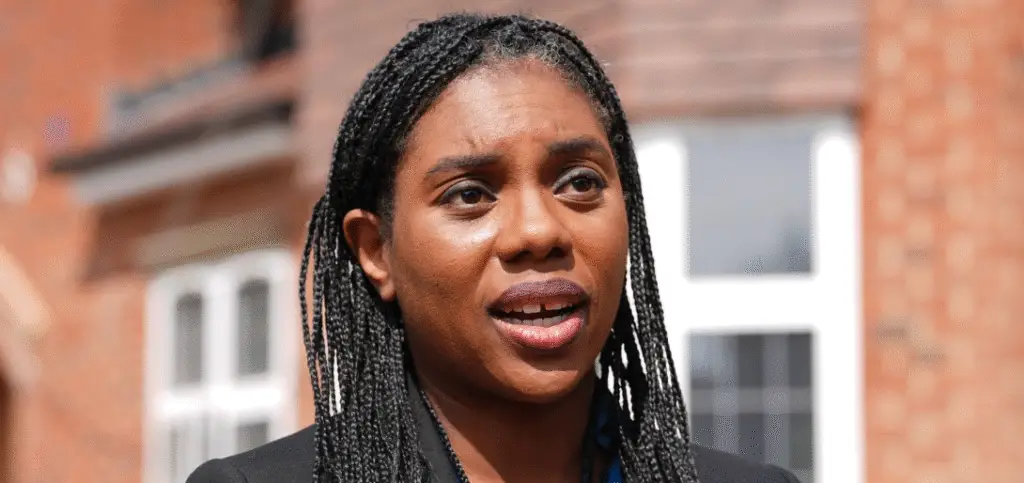Tory Leader Shifts Party Further Right With Controversial Pledges
Kemi Badenoch, the leader of the UK Conservative Party, has revealed intentions to pull out of the European Convention on Human Rights (ECHR). She pledged to remove 150,000 undocumented immigrants and foreign offenders each year, signaling a significant political move towards the right.
The commitment was announced at the Conservative Party conference in Manchester, where she aimed to rejuvenate her party’s declining support. This action, reflecting the sentiments of Reform UK, indicates a significant shift aimed at appealing to voters who are discontented with immigration matters.

Dominic Grieve Warns Policy Is a “Death Wish” for Conservatives
Dominic Grieve, the former Tory attorney general, has condemned the proposal as a “death wish,” suggesting it resembles the approach of Nigel Farage’s Reform UK. He cautioned that leaving the ECHR would distance moderates and would not effectively address migration issues.
Grieve described the notion that exiting the ECHR would resolve the migration crisis as “complete fantasy,” referencing other international treaties. He expressed concern that the party might become “indistinguishable” from Reform UK, jeopardizing its identity and electoral viability in the process.
ECHR Exit and Mass Deportation Promise Lacks Clear Details
Badenoch committed to deporting 150,000 migrants each year—approximately 500 each day—without clarifying the destinations for those being deported. Critics argue that the plan is vague in its execution and brings up legal concerns about deportations to countries deemed unsafe.
She contended that current agreements such as the ECHR and Modern Slavery Act are “employed in manners never intended,” providing a rationale for the withdrawal. Her comments positioned the policy as crucial for “robust borders” and “common culture,” resonating with nationalist feelings.
Recommended Article: UK Demands Apple Data Access, Igniting Civil Liberties Debate
Party Conference Opens With Sparse Attendance and Low Energy
The opening day of the conference experienced a significant drop in attendance, characterized by hushed corridors, vacant hotel accommodations, and trains to Manchester that were only partially filled. Key corporate sponsors were missing, and only the fringe events featuring competitors Sir James Cleverly and Robert Jenrick drew large crowds.
The primary exhibition hall showcased the centenary of Margaret Thatcher’s birth, featuring her garments and correspondence in a prominent manner. Observers pointed out that the absence of energy highlighted increasing dissatisfaction within the party regarding its direction and leadership.
Badenoch Defends Deportation Plan in Media Clash
Badenoch engaged in a heated exchange with BBC journalist Laura Kuenssberg regarding the deportation destinations for migrants outlined in her plan. She brushed off the question as “self-defeating,” suggesting that deportations might encompass nations such as Syria, Iran, and Afghanistan.
Her unwavering position highlighted the strict messaging that has become pivotal to her leadership in the face of declining poll numbers. She asserted that migrants “should not be here,” framing the matter as a crucial cultural and security concern.
Public Order Measures Target Pro-Palestine Protests
Badenoch suggested establishing a new deportation unit inspired by US ICE agents, along with stricter regulations on protests. She criticized pro-Palestine demonstrations after the recent murders of Jews in Manchester, referring to them as “theaters of intimidation.”
She pledged to “draw a line,” upholding free expression within legal boundaries while opposing demonstrations she perceived as antagonistic to British values. She highlighted the importance of unity with Britain’s Jewish community, stating, “You are an integral part of Britain and will always remain so.”
Political Stakes Rise as Conservatives Trail Reform UK
As the Conservatives sit at 16%, significantly trailing behind Reform UK’s 34%, Badenoch is under considerable pressure to turn the situation around. She positioned her vision as the sole option apart from Labour or Reform, contending that Conservatives could “unite Britain once more.”
Badenoch recognized the challenging journey ahead, stating, “We have a mountain to climb but we are ready for the challenge.” Nonetheless, numerous party insiders are skeptical about whether her approach can bring together different factions or simply exacerbate the existing divisions within the Tories.
Badenoch’s Bold Shift Aims to Win Back Right-Wing Voters but Risks Alienating Moderates and Centrists
Badenoch’s bold shift seeks to win back right-wing voters who have turned to Reform UK, yet it may also distance centrists and moderates. The approach has faced significant backlash from prominent Tories, legal authorities, and civil liberties organizations who are raising concerns about its legality and practicality.
The outcome of this gamble will determine whether it revitalizes or further fractures the party, ultimately influencing the Conservatives’ electoral prospects as they approach the next election. The conference has revealed significant divisions and uncertainty, paving the way for a tumultuous political season ahead.















